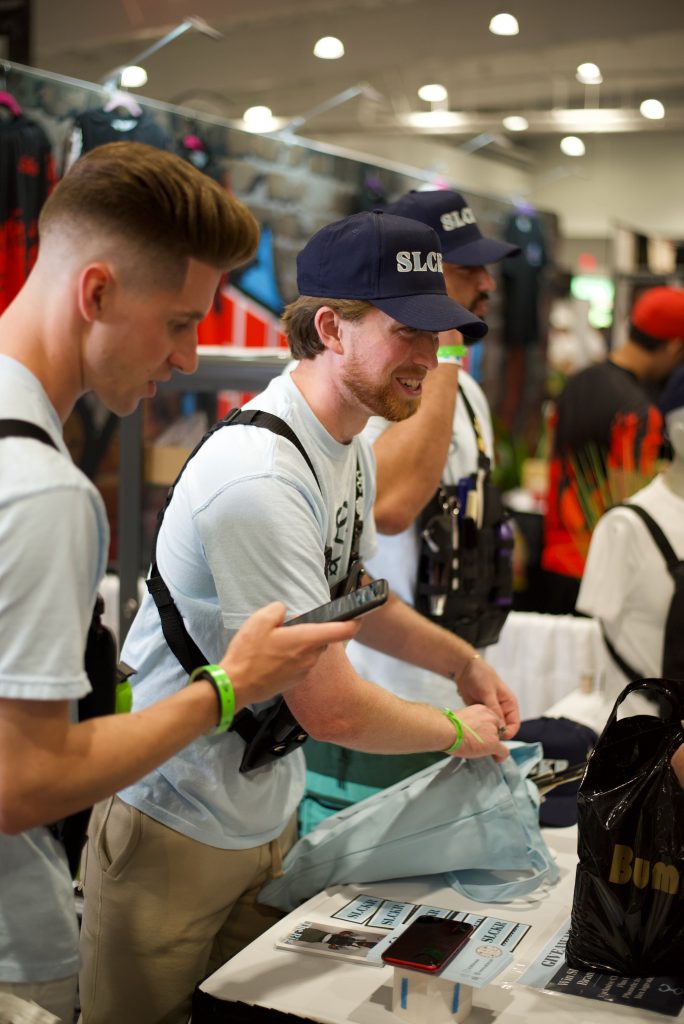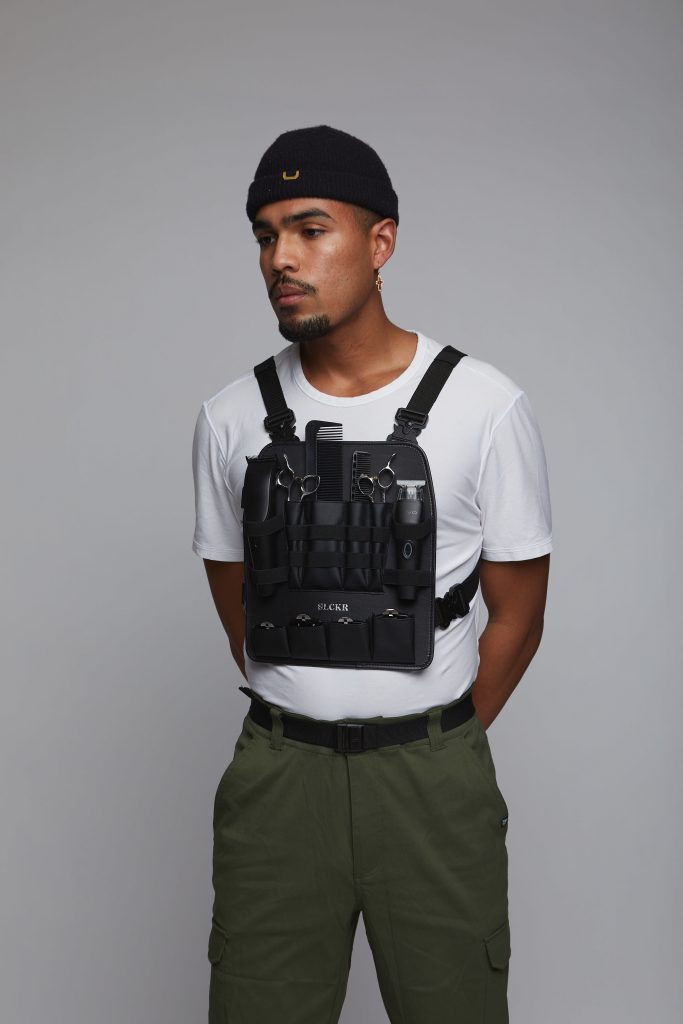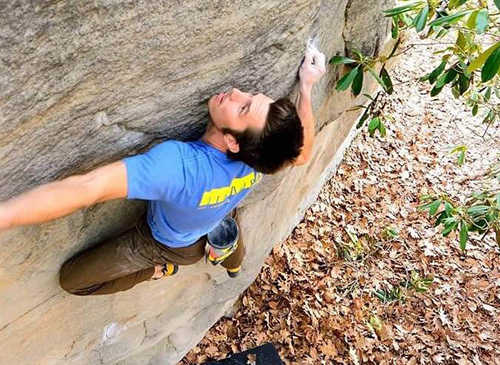Technical gear company SLCKR is creating solutions for the barbershop culture

When he was growing up, Tyler Tracy’s mom always cut his hair. But when he was 17, he stepped into a barbershop for the first time. “I was enamored,” he said.
It wasn’t just the cut — the high fade and clean lines — it was the culture. “These were the coolest people out there,” he said. “The barbershop is a cultural hotspot filled with so many diverse, interesting people.”
His love for barbering was soon coupled with innovation, and thanks to Penn State and a simpatico business partner, has turned into an industry-disrupting technical barber wear company. Here’s why SLCKR — a startup providing fashion and functionality for the modern barber — is a company to watch.
An idea is born out from barber shears, free haircuts and a Management 485 class
When Tracy moved onto University Park campus, he brought his clippers with him. His official major was industrial engineering, but his passion was barbering — and innovation — and he soon added an entrepreneurship and innovation minor.
He gave free haircuts, first in his dorm and then at his fraternity, SigEp, and even took them with him when he went to Ireland for his abroad experience. As he did, he discovered a pain point. “Haircuts took longer than they should have because I had to keep turning back and forth to the station. There were a lot of non-value added steps.”
In his Management 485 class, Professor Jeanette Miller told him that he could get $1,500 to work on a business concept … and an idea took hold.
“I remember walking to the parking garage after my call with Tyler, thinking ‘I don’t want to do this same task day after day for the rest of my life’,” he said.
“The first thing I did was call Ben Johnson,” Tracy said. The two had gotten to know each other through their fraternity. Tracy had cut Johnson’s hair and told him about his barber gear ideas and pursuing a nontraditional career path. “I told him that if he ever wanted to start something, to let me know,” Johnson said.
Johnson had already graduated from Penn State in 2019 and had a well-paying job in Texas. But he’s always appreciated the industry and creative space of barbering, respected Tracy’s innovative ideas, and wanted to be part of a startup that disrupted the industry.
“I remember walking to the parking garage after my call with Tyler, thinking ‘I don’t want to do this same task day after day for the rest of my life’,” he said.
A transformative boost into the niche culture of barbering
The two convened in Philadelphia and started SLCKR in 2021. To start a barber gear company in the middle of the Covid-19 pandemic, when most barber shops were closed for business, sounds pretty risky, but they called those first few months “transformative.”
“We really thought these things would sell like hotcakes. We saw Youtube videos of Russian barbers creating rigs like these out of bulletproof vests and designers like Louis Vuitton sell solutions like this for over $1,000. It was an idea that should have worked.”
They enrolled in InventPennState’s Summer Founders Program which provides Penn State students with $15,000 to work on their startup over a summer. “It gave us the seed money to work on our idea full time. That was really empowering,” Johnson said. Even more so, he said the Summer Founders Program gave the two access to an advisor network that gave invaluable advice. “We had a call with program advisor Matt Brezina who told us, ’I completely get what you’re trying to build — you guys are onto something here.’ … That was one of the most validating things we could have heard.”
With InventPennState’s push they formed SLCKR — fashion wearables for modern barbers, filling a niche where barbers were either hacking their own clothing to create solutions or wearing outdated fashion.
A “massive flop” turns into profitability
Their first product is called “The Rig,” a fashionable and functional chest rig for barbers that stores all the tools a barber most frequently uses throughout the course of a haircut.
Things were slow to start, with only a couple units sold in the first month. “At first we thought we had a major flop,” Johnson said. “We really thought these things would sell like hotcakes. We saw Youtube videos of Russian barbers creating rigs like these out of bulletproof vests and designers like Louis Vuitton sell solutions like this for over $1,000. It was an idea that should have worked.”
Tracy said their first failure was a learning moment. “We had to communicate, constantly iterate and just keep getting up and putting in the time to develop the vision.”

It worked. After directly reaching out to barbers to schedule phone calls and explain their product and vision, they started to gain some traction. Once user-generated content and reviews flowed in, the founders were able to develop validity in the market. Today, their profits are six-fold of what they were last year at this time, and they’ve learned a lot about the culture that’s important to SLCKR and to their team as they move forward.
“We make high-quality products and don’t sacrifice on that,” Johnson said. “We value our customers and immediately take care of any issues. We are so heavily invested into the barber community.”
They recently dropped a new color of their rig and unveiled it via text message to their customer list before listing it on their website. “So many people bought it immediately — they were grateful that we included them,” Johnson said.
“Use the resources at Penn State — that’s the cheat code — and then go for it.”
“We aren’t trying to sell products,” Tracy added. “We’re helping to tell stories about barbering as a whole and push the culture forward.”
They said their next step is to diversify their product line and offer more choice to their customers. As a fashion-focused business, the founders hope to outfit the entire barber work closet. In the future, they hope to build a physical location, too — a lofted shop where they can build gear, as well as have a place where they can offer great cuts and training in marketing and social media storytelling for other barbers.
And as they grow, “we’re staying in Philadelphia, for one thing,” Johnson said. “We have kind of a chip on our shoulder about that. I know people have big, grandiose ideas that take them to LA or New York, but we want to approach this in a different way.”
Tracy said that as they expand, they also want to keep margin. “We want to give people in this industry the opportunity to do other things. Barbers burn out — they lose their passion and love for their craft. We want to give them an opportunity to step outside of their day-to-day work and explore their talents.”
They have some advice for innovators who are just starting out. “Just do it,” Tyler said. “There are so many ideas in our lives that we don’t act on. Do it. Second, utilize resources from Penn State; the amount of help that Penn State offers is insane. It’s how I fell in love with entrepreneurship and what got me to where I am today.”
“Test and iterate,” Johnson added. “Just do it. Use the resources at Penn State — that’s the cheat code — and then go for it.”
Cara Aungst writes about industry, innovation and how Happy Valley ideas change the world. She can be reached with story ideas and comments at Cara@AffinityConnection.com.






